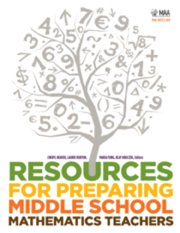Book contents
- Frontmatter
- Preface
- Contents
- I Programs for Middle School Teachers
- B In-service Training Programs
- 5 The Master of Arts in Middle School Mathematics Program at Salem (MA) State University
- 6 The Math in the Middle Institute: Strengthening Middle Level Teachers' Mathematical and Pedagogical Capacities
- 7 A Professional Development Program for Middle School Math Teachers in Maryland
- II Courses for Middle School Teachers
- B Geometry
- C Number Theory and Abstract Algebra
- D Precalculus and Calculus
- E Probability and Statistics
- F Combination Courses
6 - The Math in the Middle Institute: Strengthening Middle Level Teachers' Mathematical and Pedagogical Capacities
from B - In-service Training Programs
- Frontmatter
- Preface
- Contents
- I Programs for Middle School Teachers
- B In-service Training Programs
- 5 The Master of Arts in Middle School Mathematics Program at Salem (MA) State University
- 6 The Math in the Middle Institute: Strengthening Middle Level Teachers' Mathematical and Pedagogical Capacities
- 7 A Professional Development Program for Middle School Math Teachers in Maryland
- II Courses for Middle School Teachers
- B Geometry
- C Number Theory and Abstract Algebra
- D Precalculus and Calculus
- E Probability and Statistics
- F Combination Courses
Summary
Improving teacher quality is a national need in mathematics education and one many universities and K–12 schools across the country are working in partnership to try to address. This article describes a graduate professional development program at the University of Nebraska-Lincoln (UNL) for certified teachers that leads to a master's degree that is aimed at improving mathematics teaching and learning in the middle grades. An overview of the institutional context for middle level mathematics teacher education in which this professional development program is situated is presented (i.e., state requirements for teachers, university policies, district partnerships). We describe the Math in the Middle (M2)Institute [1] and conclude with advice for mathematicians and educators to work in collaboration as they create their program for middle level teachers.
The Institutional Context
The University of Nebraska-Lincoln, a land grant Research I institution, offers undergraduate majors for future K–12 teachers that lead to a degree from the College of Education and Human Sciences. Students can obtain elementary certification in all subject areas (K–6) or secondary certification in a single subject area (7–12). Certification programs require multiple field experiences, a semester-long student teaching experience, and passing the Praxis Series I: Pre-Professional Skills Test [2]. Elementary teachers must pass the 0011 Elementary Education: Curriculum, Instruction, and Assessment (EECIA) test, a Praxis II series assessment, in order to be considered highly qualified for No Child Left Behind.
- Type
- Chapter
- Information
- Publisher: Mathematical Association of AmericaPrint publication year: 2013
- 2
- Cited by

